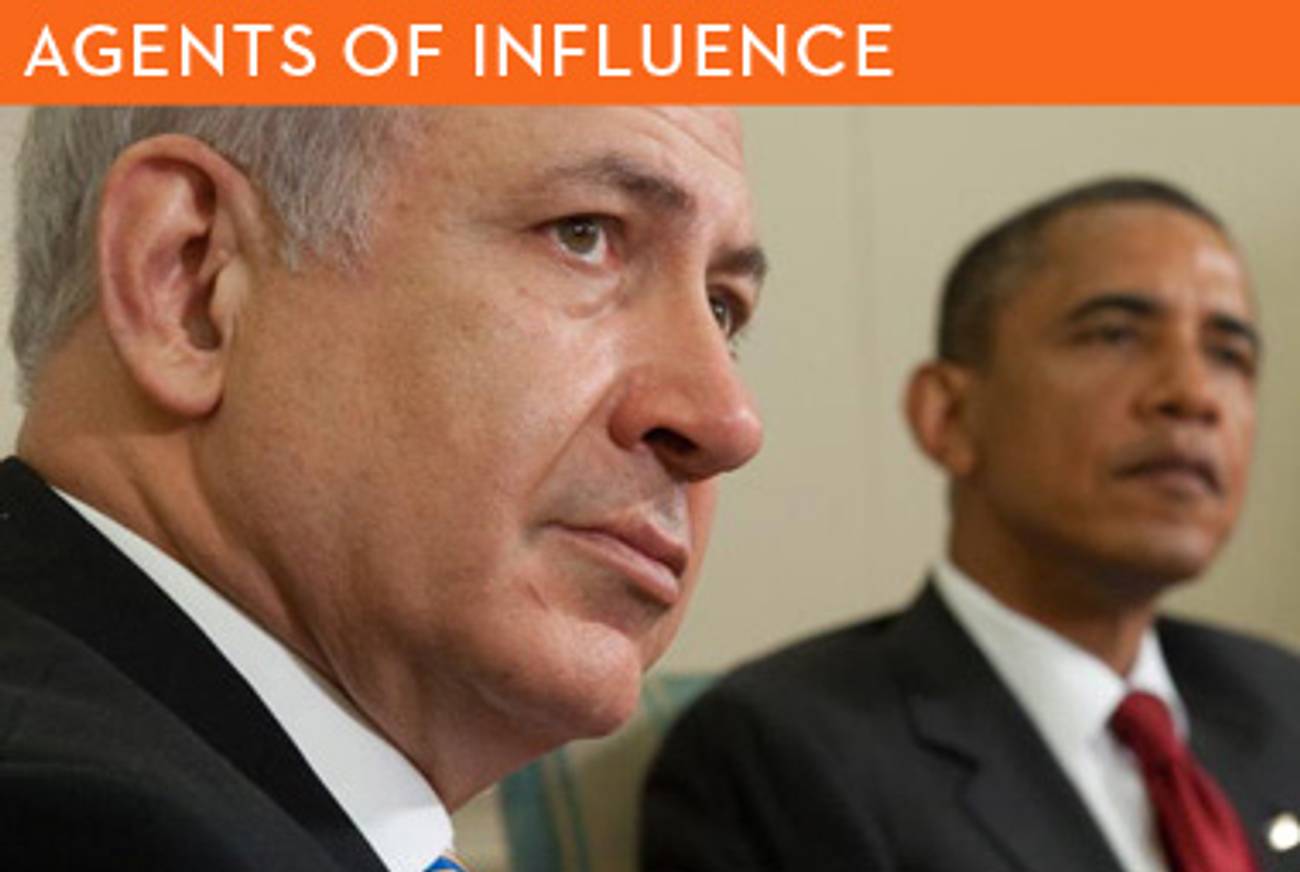Visiting Privileges
As Netanyahu arrives in Washington a final Israeli-Palestinian agreement couldn’t be further away




Shortly before Benjamin Netanyahu’s arrival in Washington yesterday, his one-time adviser Dore Gold, Israel’s former ambassador to the United Nations, made the rounds to deliver a message that the Israeli prime minister would dearly love to deliver in person—but won’t. “The Israeli people have gone through a very tough time this last decade,” Gold tells me, before laying out the position he has presented to members of President Barack Obama’s national security council staff and the State Department, as well as to think-tank researchers and journalists: that Israel cannot return to the peace process as it is currently configured. The Israelis have been down that road before, and they have paid for misfired U.S. diplomacy in blood.
“After six Israeli prime ministers and three U.S. presidents failed at the peace process,” Gold says, “you’d think people would stop and say, ‘Let’s think about this, maybe a reassessment is needed.’ ” Instead, he continues, the default reaction is to pick up the shattered relics of Oslo, an approach that tends to ignore the Second Intifada and what he has noted was a 500-percent increase in rocket attacks from Gaza after Israel’s 2005 withdrawal. “In think-tank circles it’s said that we all know what the final settlement looks like,” he says. “But this is binding Israel to a legacy of failed negotiations. If you do that, no one would ever negotiate. What if Medvedev met with Obama and said, ‘Let’s pick up where Reagan left off at Reykjavik?’ ”
The sticking point is that Washington sees a negotiated Palestinian-Israeli agreement as a vital U.S. interest to ensure an orderly withdrawal from Afghanistan and Iraq. Indeed, the White House has been willing to beat up on Netanyahu over settlements in Jerusalem even as Obama seems to be hemorrhaging Jewish political support—and fund-raising—with a midterm election only four months away.
While Gold no longer works for the Israeli government, in his post as president of the Jerusalem Center for Public Affairs he is widely held in Israeli and U.S. circles alike to be close to Netanyahu and his senior staff. “Since I left government service,” says the 56-year-old former academic, “I have been obsessed with the need for Israel to articulate in the public discourse its security requirements in the West Bank.” Netanyahu asked Gold in 1997 to accompany him to the Map Room in the basement of the White House for an intimate meeting with President Bill Clinton and one other official in which the IDF’s concept of defensible borders was laid out to the United States.
While the Palestinians’ political demands are clear (a contiguous state, a capital in Jerusalem), the Israeli side, as Gold wrote in Tablet Magazine last week, “has been far more vague,” dwelling in abstractions like peace and security without clearly articulating what that entails. The project that Gold is now pushing in Washington is meant to fill that vacuum. “Israelis have taken lots of risks for peace,” says Gold. “They should not be in a diplomatic testing ground again.”
The book Israel’s Critical Security Needs for a Viable Peace is a collection published this year under the auspices of the JCPA with essays about security and diplomacy by leading figures in Israel’s security establishment, like Maj.-Gen. Aharon Ze’evi Farkash, former head of IDF intelligence, and Maj.-Gen. Uzi Dayan, former IDF deputy chief of staff and a former national security adviser to Prime Ministers Ehud Barak and Ariel Sharon. The volume’s findings represent a broad consensus across the Israeli political spectrum, and the fact that Lt.-Gen. Moshe Yaalon—former IDF chief of staff and currently the vice prime minister—wrote the introduction is evidence that the ideas have won approval at the highest political levels.
The book pushes three common ideas, some likely to add to the friction between Washington and Jerusalem: First, Israel, must not withdraw to the 1949 armistice lines; second, Israel needs defensible borders; third, Israel must rely on itself to defend itself and not on foreign forces as proposed by U.S. national security adviser Gen. James Jones, who has talked openly about replacing the IDF with international forces in the West Bank.
The insistence that Israel must retain the ability to defend its own borders—a basic attribute of national sovereignty—is the least controversial element of Gold’s blueprint. The issue is not merely the inglorious record of U.N. peacekeeping forces—from Sinai to Bosnia and Lebanon—but also the fact that the international community rarely sends its blue helmets into the middle of a real shooting war, which is what the West Bank would become if an IDF withdrawal left Hamas and Fatah at each other’s throats and eager to gain credit for launching terror attacks on Israel.
The concept of defensible borders is closely tied to the drawing of 1949 armistice lines, commonly and incorrectly known as the 1967 borders. As Gold explains in his contribution to the volume, successive U.S. administrations since Lyndon Johnson’s have all recognized the danger in Israel withdrawing to those borders. George Shultz, one of President Ronald Reagan’s secretaries of State, explained that “Israel will never negotiate from or return to the 1967 borders,” and the Clinton Administration reaffirmed the Reagan White House’s concept of defensible borders. However, it was during Clinton’s Camp David negotiations that then-Israeli Prime Minister Ehud Barak abandoned the idea of defensible borders in the hope of a radical breakthrough with Yasser Arafat. With the outbreak of the Second Intifada and peace nowhere in the offing, the George W. Bush Administration pledged not to hold the Israelis to the Clinton parameters and returned to the traditional U.S. position. “It is unrealistic to expect that the outcome of final status negotiations will be a full and complete return to the armistice lines of 1949,” reads an April 14, 2004 letter from Bush to then-Prime Minister Ariel Sharon.
Gold, who was not officially in the Sharon government, was nonetheless employed in a number of missions and prepared Sharon’s presentation to Bush on the significance of defensible borders during their first meeting, in 2001. Gold sat in the Roosevelt Room as Sharon entered the Oval Office with the index cards Gold had written. “Years later, when Sharon completed negotiations over the Bush letter in 2004,” says Gold, “he instructed his team in Washington to call me in Jerusalem to say we got defensible borders into the letter.”
Even as the Bush letter applied regardless of who sat in the White House (it won wide bipartisan approval in the House and Senate, with both Hillary Clinton and Rahm Emanuel voting in favor), the Obama Administration has not yet clearly signaled if it intends to accept the commitments of its predecessor. Insofar as Israel sees the letter as “the foundation for the United States to accept new construction in the Jewish settlements that encircle Jerusalem,” it is yet another source of contention between Netanyahu and Obama.
Perhaps even more daunting is the prospect of any Israeli government having to explain to the Obama White House that many of the land swaps from Camp David are not plausible in the context of defensible borders. In other words, everyone in Washington who believes that they know what Israel’s vision of a final settlement looks like is in for a surprise. Israel will have to retain security control over the Jordan rift valley, which means not just the river bank but the eastern slopes of the West Bank hill ridge. It is important to remember that the West Bank overlooks Israel’s coastal plain and 70 percent of the country’s population. If the Hamas rockets fired from Gaza were launched from the West Bank on Tel Aviv and Jerusalem, it could bring Israel to its knees, disrupting the country’s economic and social life on a massive scale and shutting down Ben Gurion Airport. Moreover, Islamist militants from all around the region would attempt to transit through Jordan into the West Bank to launch attacks against the Zionist entity, destabilizing the Hashemite Kingdom.
“The concepts in this book are very close to last Knesset speech of Rabin, given thirty days before he was assassinated,” says Gold. The rhetorical point is clear enough: For all the nostalgia in the United States for a visionary statesman like Rabin, a warrior and also a man of peace, he also articulated most clearly Israel’s need for defensible borders and said nothing about land swaps. If those ideas have been lost in the last 20 years, the Israelis are also to blame. “A lot of Israel’s biggest mistakes is that Israeli diplomats put forward plans and pushed it back to the military,” says Gold. “For instance, Oslo began with two academics, and later representatives of the Foreign Ministry came in. When it became official, that’s when the army came in, at the end. I strongly believe we have to reverse the sequence—to lay out Israel’s security needs and then come out with diplomatic process to protect them.”
There is no going back to Oslo, no matter what the Obama Administration believes or hopes. Perhaps the only thing saving Netanyahu from having to fight with a U.S. president and thereby unnerve the Israeli electorate is the incompetence of the White House. Had Obama not pushed Netanyahu so hard on settlements, twice, he wouldn’t have pushed Mahmoud Abbas into a corner where it was impossible for the Palestinian president to be less intransigent than the United States, thus freezing the diplomatic process.
The paradox of the U.S. president’s sympathy for the Palestinian cause and lack of sympathy for Israeli territorial and security claims is that he has managed to fulfill the dreams of hard-liners on both sides and turn back the clock 20 years to before the ill-fated Oslo process even began. For the first time in two decades, the Palestinians and Israelis are not in direct negotiations. A final Palestinian-Israeli agreement couldn’t be further away, which means that Netanyahu can smile for the cameras and shake the president’s hand and breathe easily, now that he doesn’t have to explain that a peace deal, if it happens, won’t look like what everyone in Washington thinks it will.
Lee Smith is the author of The Consequences of Syria.
Lee Smith is the author of The Permanent Coup: How Enemies Foreign and Domestic Targeted the American President (2020).